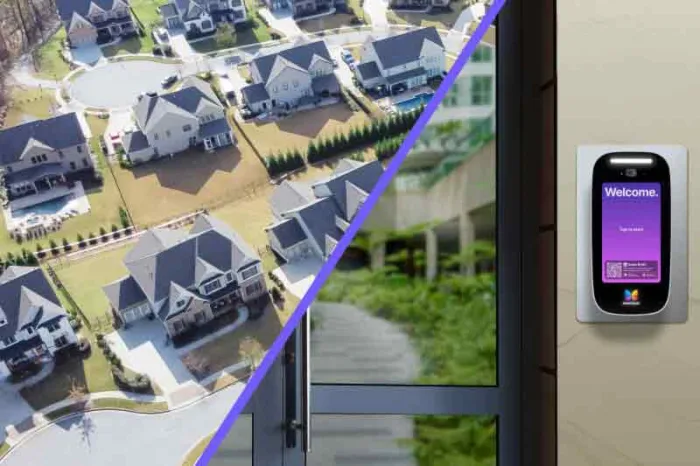Key takeaways
- Condo associations are organizations comprised of owners in the building that oversee the management of the entire property.
- Homeowners associations are similar to condo associations, but they handle the management of single-family homes and lots within a neighborhood.
- Condos and HOAs are similar, but they have small differences in fees, ownership, and management.
- Challenges of operating a condo vs. HOA include collecting fees, enforcing bylaws, and maintaining the community.

When navigating where to live, you may encounter the difficult choice between a condominium and a homeowners association. While both offer community-oriented living, they do have their differences. As a result, condo vs. HOA is a common consideration for prospective owners.
For that reason, in this blog, we cover what condo and homeowners associations are. Most importantly, you’ll discover how these organizations compare, from their fees and maintenance to ownership and rules.
This post covers:
- What is a condo association?
- Condo pros and cons
- What is a homeowners association?
- HOA pros and cons
- Condo vs. HOAs
- Challenges facing HOAs and condos
What is a condo association?
A condo association, also known as a condominium association, is a type of community organization made up of building homeowners who work together to maintain the property.
Condo associations are responsible for maintaining and managing common areas and amenities, creating and enforcing bylaws, and collecting dues from other homeowners to cover expenses such as building repairs.
The association board is made up of unit owners who are elected by the community. Then, they make decisions on behalf of the condo building to ensure it operates smoothly.
What do most condo fees include?
The coverage of condo fees will vary, but we’ve found that most include:
- Utilities
- Landscaping
- Amenities
- Repairs
- General maintenance
- Special assessment fees
Condo pros and cons
The advantages of condos include:
- The cost of maintaining the building and common areas is lower because it’s shared among all condo owners.
- You have access to high-quality amenities, such as a gym, swimming pool, or dog park, which would likely be unavailable in a single-family home.
- Condos are often located in urban, high-density areas, meaning you have quick access to a variety of restaurants, shops, and entertainment.
- A condo may be more attractive to first-time homebuyers because it requires less maintenance and is usually more affordable.
- Condos could be a great first investment for those looking to start their real estate portfolio.
The disadvantages of condos are:
- Condos charge monthly fees for all owners that are calculated by the size of your unit. While these fees may be annoying, they are used to pay for the building’s maintenance, landscaping, common areas, utilities, and more.
- Condos are similar to apartments in that they may lack privacy, with units being closely located to yours. Not to mention, common areas are shared, so you won’t have private access to them.
- Condo associations adopt bylaws that impose certain restrictions on homeowners, such as pet policies, remodeling, and the ability to rent out the condo or use it as an Airbnb. Thus, these restrictions may feel overbearing for some potential buyers.
- Finally, it may be more difficult to find a buyer for your condo if you’re looking to sell.
What is a homeowners association?
A homeowners association, also known as HOA, is an organization that oversees the management of single-family homes and lots in a neighborhood.
HOAs are very similar to condo associations in that a board of directors establishes and enforces rules, collects fees, and maintains the community. Moreover, the board of directors is elected by the other condo owners.
How much of an HOA fee is too much?
Determining whether an HOA fee is reasonable can be challenging, as it varies based on your community’s characteristics. HOA fees are intended to cover the ongoing expenses of managing a property, such as electricity, waste disposal, and sewage, while also creating a reserve to fund long-term projects or cover unexpected repairs.
To assess its fairness, we suggest that you request a copy of your property’s budget from your board and review whether there is an opportunity to save money by cutting unnecessary expenses or finding less expensive options. Another option is to compare your fees with those of similar communities nearby and ensure they fit within your budget.
What percentage of Americans live in HOAs?
According to the 2019-2020 National and State Statistical Review for Community Association Data, approximately 27% of Americans live in an HOA.
HOA pros and cons
The pros of an HOA include:
- Homeowners associations offer residents a variety of amenities, such as a swimming pool, dog park, or tennis courts.
- Your HOA will have a set of policies and bylaws that determine what houses can look like, ranging from types of materials to color and architectural styles. As a result, your neighborhood will have a matching aesthetic that you may find welcoming.
- With the inclusion of bylaws and maintenance, you can expect your HOA to protect the value of your property throughout the ever-changing housing market.
Cons of HOAs include:
- Monthly dues are often a turn-off for many when it comes to HOAs, but such fees are used to maintain the community’s communal spaces.
- Similarly to condos, HOAs will have rules that may feel oppressive to some.
- If you do not follow the rules of your HOA, you can be severely punished, such as additional fees. These types of infractions may feel aggressive to some.
Learn the difference between a condo and apartment building:
Condos vs. HOAs
Condos and HOAs are similar in many ways. Nevertheless, both have certain nuances that you should be knowledgeable of before making a decision on where to live.
Condos vs. HOAs can be compared in the following ways:
Here’s our brief overview of how condos and HOAs compare:
Ownership
While residents in condos and HOAs will own their units or lots, ownership varies when it comes to communal spaces.
Condo ownership extends to communal spaces, also known as general common elements (GCE). In other words, every resident shares ownership over common areas, such as the lobby, landscaping, gym, and swimming pool.
Meanwhile, residents in HOAs own their houses and the associated lot. Although they have rights to use common areas, they don’t have ownership over them.
Maintenance
Maintenance for condos vs. HOAs is handled the same way.
Condo associations cover repairs and maintenance for common areas and the building, like the roofing, security system, and elevators. However, condo owners are responsible for the maintenance of their own units. They are also responsible for maintaining their limited common elements (LGE), which are amenities exclusive to certain units, such as a balcony or patio.
Furthermore, HOAs manage and repair the community’s spaces, while homeowners must manage their designated lot. In some cases, HOAs may even cover the landscaping of individual lots.
With that said, it’s important to note that HOAs require homeowners to maintain a certain level of quality when it comes to the exterior of the home. As such, the cost of maintaining your home will be higher than a condo.
Fees
Condo and HOA residents must pay monthly fees. They typically pay fees as a percentage of the total according to their lot or unit size. Additionally, these associations may levy fees for community upgrades, such as installing new carpeting in the common areas or painting the exterior of the property, which are one-time charges.
The difference between condo fees and HOA fees is that condo owners will typically pay more in fees. Why? Condos must pay for maintenance and insurance for the exterior of the building and common areas, whereas HOAs have fewer obligations for such expenses.
Management
The people who make up the association at a condo and HOA can vary as well.
Generally, condo and homeowner associations are operated by appointed members of the community who are voted in by residents. Voting is normally done annually, and any homeowner can be included on the ballot.
Due to the size of smaller condo buildings, all residents may participate in managing the association. For example, if a condo building has only six units, all residents may be members of the association, ensuring everyone has a say in managing shared amenities and responsibilities.
Lastly, HOAs and condos can be self-managed or managed by an external team. When a property is self-managed, each homeowner is assigned a responsibility to manage and maintain the property. Self-managed properties are not very common and are typically only seen in smaller properties.
When an external team manages a property, the board selects a third-party company to assist with duties. While the property management company doesn’t have power over the community, it does act as an advisor to the board. So, it may assist with finances, establishing policies, coordinating with vendors, and more.
Rules
HOAs and condos enforce guidelines, also known as bylaws, established by the association. These bylaws cover areas like pet ownership, home modifications, and noise restrictions. Naturally, these regulations can vary significantly depending on the community’s bylaws.
For example, HOAs and condos outline policies regarding home remodeling projects. They may require board approval for certain remodeling efforts, ensuring community standards are upheld for the overall aesthetic and functionality of the property.
Since the HOA and condo boards are self-governing, these bylaws can be updated or changed by a majority vote of the board members.
Challenges facing HOAs and condos
The primary challenges facing condos and HOAs are:
Resident disputes
HOAs and condos are bound to have regular disputes among neighbors. These may require the board to take action, such as fining an individual or even consulting a third party, like an attorney or management company.
Condo living means we’re all living in close proximity to one another, so noise complaints are common. We encourage direct communication between neighbors to resolve any minor issues. If the association needs to intervene, we’ll strive to stay objective when resolving the problem.
Enforcing bylaws
Condos and HOAs must establish clear bylaws that help maintain the quality of the property. However, some residents may not always follow these policies, leading to the board having to take action.
We always start with communication and education on the matter. That way, residents will have the chance to address their violations voluntarily. We’ll escalate measures to warnings, fines, and mediation when needed. But ultimately, our goal is to make sure everyone is cooperative and understanding.
Collecting dues
Monthly dues or fees pay for maintenance, landscaping, utilities, insurance, and, for some communities, building a reserve of funds in the event of an emergency. For that reason, it is crucial for homeowners to pay their dues on time for the betterment of the community.
We recommend that the most effective solution is to offer residents a convenient payment option with clearly outlined consequences for delinquent payments.
Maintaining the building
A serious challenge condos and HOAs face is allocating sufficient resources to cover maintenance costs while keeping resident dues reasonable. The balance of the budget requires careful planning and prioritization of maintenance projects based on urgency and available funds.
Organizing and coordinating maintenance projects can be complicated for larger properties. Fortunately, vendors and contractors can help you effectively manage large-scale projects with clear planning and communication.







